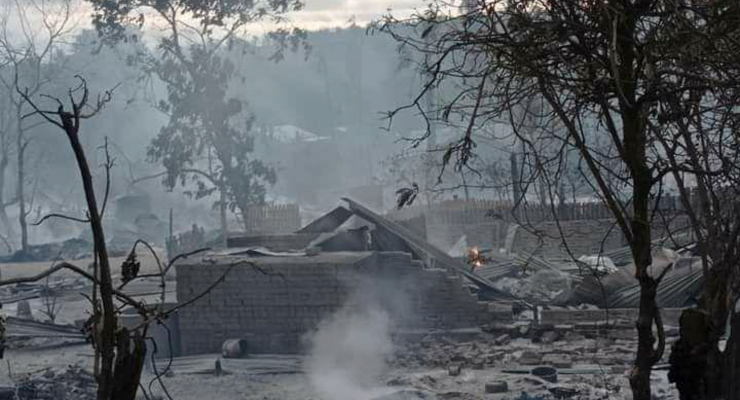
A bipartisan parliamentary committee has recommended the Australian government consider placing sanctions on senior members of Myanmar’s military following a devastating coup earlier this year.
Nearly 1000 people have been killed by security forces in the country since the Tatmadaw, Myanmar’s military, took over in February. So far, Australia has resisted calls to follow other Western nations like the United States in imposing sanctions, drawing fierce criticism from human rights advocates and opposition politicians.
But this week’s report, from a subcommittee of the Joint Standing Committee on Foreign Affairs, Defence and Trade, which is chaired by Liberal MP Dave Sharma, and includes members and senators from across the political divide, could place further pressure on the Morrison government to act.
The report’s eight recommendations include calls for the government to explore granting pathways to permanent residency for Myanmar nationals, and to contribute to international discussions around an arms embargo.
Australia’s slow response to coup
In February, the Tatmadaw seized power in a military coup, thrust the nation into a state of emergency, and charged Aung San Suu Kyi, the country’s de facto leader, with a series of trumped-up offences.
With waves of violence rippling across the country, and a brutal crackdown on anti-coup protesters, Australia’s own ties to Myanmar’s military quickly came under scrutiny. In March, a month after the coup, Foreign Minister Marise Payne announced Australia was finally suspending military cooperation with the country, which had continued for years in spite of the Tatmadaw’s attempted ethnic cleansing of Rohingya Muslims. Documents obtained by the ABC under freedom of information show Australia’s ties did not loosen as evidence of the military’s grave human rights abuses became apparent.
While the US, UK and Canada have imposed a series of targeted sanctions on the regime, Australia has resisted calls to do the same.
This month, Payne said Australia’s consideration was not to impose them at this time.
“It is not our view that they would advance our interests and our interests in supporting the ASEAN-led solution and the ASEAN efforts that are being made,” she told Senate estimates.
Australia director at Human Rights Watch Elaine Pearson told Crikey the government’s position on Myanmar, which seems to be driven by a deference to ASEAN, has been “appallingly weak”.
“This is a military regime that took power through a coup, we’ve had thousands arbitrarily detained, and more than 800 killed. If that’s not enough to cause us to impose targeted sanctions, what will they impose targeted sanctions over?” she said.
Greens foreign affairs spokesperson Janet Rice, a strong critic of Australia’s coup response, will introduce a bill requiring Payne to explain the government’s stance on sanctions.
“The Australian government has sat on its hands for almost five months while the people of Myanmar have called for urgent action, and other countries around the world have heeded their calls,” Senator Rice said.
More pressure
Yesterday’s report shows Rice’s concerns are shared by many inside the Morrison government. Chaired by Sharma, a former diplomat, the subcommittee includes Liberal backbenchers Ross Vasta, Phillip Thompson and Vince Connelly, Senator David Fawcett, and Nationals whip Damian Drum.
“Australia has a clear national interest in the cessation of violence in Myanmar; the restoration of civilian, democratic rule; and the resumption of Myanmar’s economic and social development,” Sharma said.
On the sanctions question, the committee acknowledged “different views” on their effectiveness among members, but agreed that they clearly warranted further consideration.
Pearson is encouraged by the calls from inside the government to act on Myanmar, but wants Australia to take a more consistent approach to calling out human rights abuses in our region.
“I think there’s a real distinction between the government’s appetite to take on human rights issues when it comes to China, which is obviously the most serious threat to human rights in our region, and other countries in our region that are also concerning.”
What do you think? Should Australia impose sanctions on Myanmar? Write to letters@crikey.com.au and don’t forget to include your full name if you’d like your letter to be considered for publication.








Who makes money from Myanmar?